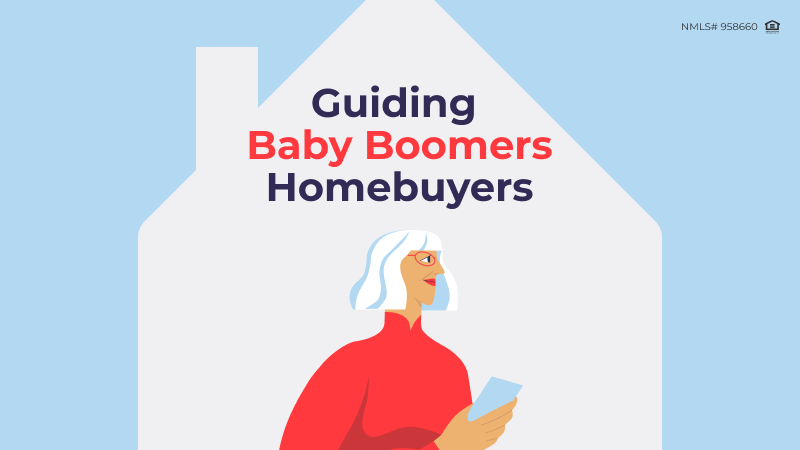The Baby Boomer generation, born between 1946 and 1964, is experiencing a unique phase of life as they approach retirement and consider their housing options. As a mortgage broker, understanding the distinctive characteristics, preferences, and challenges faced by Baby Boomers is essential in providing effective guidance. This article will explore comprehensive strategies for advising Baby Boomer mortgage journey. We’ll delve into their characteristics, relevant housing trends, potential cautionary events, misconceptions they might have, and successful marketing approaches.
Struggling with a loan scenario?
Get a solution in 30 minutes!
Fill out the short form and get a call from our AE
Submit a Scenario
Baby Boomer Characteristics
-
Financial Stability and Accumulated Wealth:
Baby Boomers, having spent several decades in the workforce, often boast financial stability and have accumulated substantial assets. They have had the opportunity to invest wisely and build a solid financial foundation, making them well-prepared for retirement.
-
Homeownership Culture:
Baby Boomers grew up in an era where homeownership was seen as a fundamental pillar of the American Dream. Many of them bought their first homes at a relatively young age and have experienced the ups and downs of the real estate market.
-
Strong Work Ethic:
This generation is known for its strong work ethic and dedication to their careers. They have often held long-term positions, which contributed to their financial success and stability.
-
Empty Nesters:
As their children have grown up and left home, many Baby Boomers are transitioning into the role of empty nesters. This change in family dynamics often prompts them to reevaluate their housing needs, leading to considerations of downsizing or relocating.
-
Health and Aging:
As they age, Baby Boomers become increasingly focused on their health and well-being. This may influence their housing choices, with some opting for homes that offer features like accessibility modifications or proximity to healthcare facilities.
-
Legacy and Family Values:
Baby Boomers often place great importance on family values and leaving a legacy. Their housing decisions may reflect their desires to create comfortable and welcoming spaces for family gatherings and to provide for future generations.
-
Active Lifestyle:
Many Baby Boomers are embracing an active lifestyle in retirement. They seek homes in communities that offer recreational amenities, fitness facilities, and opportunities for social engagement.
-
Technology Adoption:
While not digital natives, Baby Boomers have adapted to technology, using it for various purposes, including researching real estate options, communicating with agents, and managing financial matters.
-
This generation often becomes more deeply involved in community activities, including volunteering and participating in local organizations. They may seek homes in neighborhoods that offer opportunities for community engagement.
-
Sustainable Living:
Environmental consciousness has gained prominence among Baby Boomers. They may be interested in energy-efficient homes and sustainable living practices, reflecting their desire to leave a positive impact on the environment.
Housing Trends Shaping Advising Strategies
Aging in Place
A prominent trend among Baby Boomers is the preference for “aging in place.” Many members of this generation wish to remain in their current homes and neighborhoods as they age. This trend is driven by a desire for familiarity, emotional attachment to their homes, and the comfort of being in a familiar environment.
As a mortgage broker, it’s essential to discuss aging-in-place options with Baby Boomer mortgage clients. This may involve recommending home modifications for increased accessibility and safety or exploring reverse mortgage options to help fund these improvements. Additionally, discussing potential future healthcare costs and long-term financial planning is important to ensure they can comfortably remain in their homes.
Active Adult Communities
Baby Boomers are increasingly drawn to active adult communities designed specifically for retirees. These communities offer a range of amenities and activities tailored to the interests and needs of this generation. These include fitness centers, golf courses, social clubs, and easy access to healthcare services.
When advising Baby Boomers interested in active adult communities, it’s crucial to understand their preferences and lifestyle goals. Brokers should assist them in exploring communities that align with their interests and budget. Financing options, such as reverse mortgages or downsizing, can be discussed to help them transition to these communities comfortably.
Multigenerational Living
In some cases, Baby Boomers are choosing to live with their adult children or extended family members under one roof. This decision can be influenced by cultural norms, financial considerations, or a desire to provide support and care for family members.
If a Baby Boomer client expresses interest in multigenerational living, brokers should facilitate discussions around finding homes that offer sufficient space and privacy for all family members. Financing options like HELOCs (Home Equity Lines of Credit) or refinancing can also be explored to make these arrangements more manageable.
Downsizing and Rightsizing
As their children leave home and retirement approaches, many Baby Boomers consider downsizing or rightsizing their living spaces. This may involve moving to smaller homes, condos, or townhouses that better suit their current needs and reduce maintenance responsibilities.
When discussing downsizing, brokers should help Baby Boomers evaluate their space requirements, budget, and ideal location. Additionally, they can explore financing options, including the sale of their current home and the purchase of a new one, ensuring a seamless transition.
Understanding these housing trends and their implications is crucial for mortgage brokers when advising Baby Boomers. Tailoring advice and financial solutions to align with these trends and the specific goals of each client will help ensure a smooth and successful homebuying or downsizing process during this important phase of their lives.
Events Shaping Baby Boomers’ Caution
-
Market Memories – Economic Downturns
Baby Boomers have lived through various economic downturns and housing market fluctuations. One of the most significant events was the 2008 financial crisis, which had a profound impact on their finances and attitudes towards real estate.
Impact: The 2008 financial crisis resulted in plummeting home values and widespread foreclosures. Many Baby Boomers saw their home equity diminish, and some may have lost their homes. This experience left a lasting impression, making them cautious about the potential risks associated with homeownership.
Advising Strategy: When working with Baby Boomer mortgage clients, it’s essential to acknowledge these past events and their impact on their perception of the housing market. Provide reassurance by discussing the post-2008 recovery, emphasizing the importance of long-term investments in real estate, and highlighting market stability in recent years.
-
Retirement Planning Challenges
Baby Boomers are facing retirement with varying levels of preparedness. Some may have well-funded retirement accounts and pensions, while others might be concerned about funding their retirement and maintaining their desired lifestyle.
Impact: Concerns about retirement funding can influence Baby Boomers’ housing decisions. They may be more cautious about taking on a mortgage or making significant real estate investments, fearing that it could impact their retirement savings.
Advising Strategy: Brokers should engage in comprehensive financial planning discussions with Baby Boomer clients. Assess their retirement goals, income sources, assets, and debts to provide tailored mortgage solutions that align with their financial situation. Discuss strategies for balancing housing expenses with retirement savings and income.
-
Healthcare and Long-Term Care Costs
As Baby Boomers age, they become increasingly aware of potential healthcare and long-term care expenses. These concerns can shape their housing choices and financial decisions.
Impact: Baby Boomers may be cautious about committing to large mortgage payments or high property taxes, as they want to ensure they have the financial means to cover future healthcare costs, including medical bills and long-term care expenses.
Advising Strategy: Mortgage brokers should discuss these concerns openly with Baby Boomer clients. Explore mortgage options that align with their budget and long-term financial goals. Additionally, consider the potential benefits of downsizing or utilizing home equity for future healthcare needs.
-
Changing Family Dynamics
Baby Boomers often find themselves navigating changing family dynamics. This includes caring for aging parents, supporting adult children, and potentially welcoming grandchildren into their homes.
Impact: These family responsibilities can impact Baby Boomers’ housing decisions. They may need homes that accommodate multigenerational living or provide space for adult children who may temporarily return home.
Advising Strategy: Brokers should discuss the potential housing needs associated with changing family dynamics. Explore options for homes that offer flexibility and space for various family members while staying within budget constraints. Mortgage solutions, such as refinancing or home equity loans, can be considered to facilitate these transitions.
Understanding the cautionary events that impact Baby Boomers is essential for mortgage brokers when advising this generation. By addressing these concerns and tailoring financial solutions to mitigate potential risks, brokers can help Baby Boomers make informed decisions about their housing choices during this significant phase of life.
Misconceptions About Homeownership
-
Misconception: Downsizing Guarantees Savings:
Some Baby Boomers may believe that downsizing to a smaller home or condo will automatically result in significant cost savings.
Clarification: While downsizing can lead to cost savings, it’s essential to consider all financial aspects. Smaller homes often have lower property taxes and reduced maintenance costs, but factors like location, property condition, and market conditions can influence the financial impact of downsizing. Mortgage brokers can help Baby Boomers analyze the potential financial benefits of downsizing while considering their specific circumstances.
-
Misconception: Home Equity is Inaccessible:
Some Baby Boomers might mistakenly think that once they’ve paid off their mortgage, their home equity becomes inaccessible or unusable.
Clarification: Home equity is a valuable asset that can be tapped into through various means, such as home equity loans, home equity lines of credit (HELOCs), or reverse mortgages. These options allow Baby Boomers to access their home equity for various purposes, including renovations, healthcare expenses, or supplementing retirement income. Brokers can guide clients in exploring these options and understanding the potential benefits and risks.
-
Misconception: Renting is a Hassle-Free Alternative:
A common misconception among Baby Boomers is that renting is hassle-free compared to homeownership. They may believe that renting eliminates maintenance responsibilities and offers more flexibility.
Clarification: While renting can offer flexibility and reduced maintenance responsibilities, it comes with limitations. Renters have less control over their living space, may be subject to rent increases, and do not build equity as homeowners do. Brokers can help Baby Boomers weigh the pros and cons of renting versus owning based on their specific lifestyle and financial goals.
-
Misconception: Mortgages are Only for the Young:
Some Baby Boomers may assume that obtaining a mortgage is primarily for younger generations and that they are too old to qualify.
Clarification: Baby Boomers can qualify for mortgages, and age itself is not a barrier to homeownership. Lenders evaluate applicants based on various factors, including income, creditworthiness, and debt-to-income ratio. Mortgage brokers can assist Baby Boomers in finding mortgage programs that suit their financial situation and retirement plans.
-
Misconception: It’s Too Late to Invest in Real Estate:
Some Baby Boomers might think that it’s too late to invest in real estate, assuming that the prime opportunities have passed.
Clarification: Real estate can be a viable investment at any age. Baby Boomers can still explore real estate investments, whether through purchasing rental properties or participating in real estate investment trusts (REITs). Brokers can guide them in making informed investment decisions based on their financial objectives.
-
Misconception: Selling is the Only Way to Access Home Equity:
Baby Boomers may mistakenly believe that selling their home is the only way to access their home equity.
Clarification: Accessing home equity doesn’t always require selling the home. Options like reverse mortgages allow Baby Boomers to tap into their home equity while continuing to live in their homes. Brokers can explain these alternatives and help clients choose the one that aligns with their financial goals.
Addressing these misconceptions is crucial when advising Baby Boomers about homeownership and related financial decisions. By providing accurate information and clarifying these misunderstandings, mortgage brokers can empower Baby Boomers to make well-informed choices that support their financial security and lifestyle aspirations in their retirement years.
Advising Baby Boomer Mortgage Clients
-
Comprehensive Financial Planning:
Understanding the financial landscape of Baby Boomer clients is paramount. Start by assessing their retirement goals, income sources, existing assets, debts, and expenses. This holistic view will serve as the foundation for tailored advice.
Strategy: Collaborate with financial advisors to create a comprehensive financial plan that considers their mortgage as part of their broader retirement strategy. Ensure they have a clear understanding of how homeownership fits into their retirement goals.
-
Lifestyle Needs Assessment:
Recognize that Baby Boomers have diverse lifestyle preferences in retirement. Some seek quiet retreats, while others prefer vibrant communities or proximity to family. Conduct a thorough lifestyle needs assessment to align their housing choices with their aspirations.
Strategy: Engage in open and detailed discussions about their lifestyle preferences, including location, amenities, and community activities. Explore homes that fulfill these criteria.
-
Market Insights:
Baby Boomers benefit from staying informed about local housing market trends, recent sales, and future projections. Providing them with data and market insights empowers them to make informed decisions.
Strategy: Regularly share market reports, neighborhood profiles, and property value trends in the areas of interest. Discuss how these trends may affect their investment and retirement plans.
-
Mortgage Options Tailored to Retirement:
Highlight mortgage options that cater to Baby Boomers’ retirement phase. This may include reverse mortgages, home equity conversion mortgages (HECMs), or traditional mortgage products with flexible terms.
Strategy: Carefully explain the benefits and potential drawbacks of each mortgage option. Ensure clients fully understand the implications of their choices on their financial situation and estate planning.
-
Addressing Down Payment and Financing:
Discuss available down payment assistance programs and low-down-payment mortgage options. Many Baby Boomers may not have substantial liquid assets, and understanding financing options is crucial.
Strategy: Collaborate with lenders who specialize in mortgage programs for older borrowers. Explore strategies like using home equity or downsizing to cover down payment needs.
-
Long-Term Financial Planning:
Encourage Baby Boomers to consider long-term financial planning in relation to their housing decisions. Discuss how factors like property taxes, maintenance costs, and potential home equity use impact their overall financial health.
Strategy: Share financial planning tools and resources to help Baby Boomers calculate the long-term costs and benefits of different housing options. Highlight the importance of regularly reviewing their financial plan to adapt to changing circumstances.
-
Tax Implications and Benefits:
Familiarize Baby Boomer clients with potential tax benefits and implications of homeownership during retirement. Explain how property taxes, mortgage interest deductions, and capital gains taxes may affect their financial situation.
Strategy: Work with tax professionals or provide resources that detail the tax aspects of homeownership in their specific location. Help clients maximize tax benefits while ensuring compliance with tax laws.
-
Healthcare Considerations:
Recognize that healthcare costs can be a significant factor in retirement. Discuss how their housing choices may impact healthcare access and expenses.
Strategy: Consider properties that offer proximity to healthcare facilities or explore home modifications for aging in place. Educate clients about the potential role of home equity in covering healthcare expenses.
-
Estate Planning:
Help Baby Boomers understand how their housing decisions fit into their estate planning. Discuss strategies for passing down real estate assets, addressing potential inheritance tax issues, and creating a comprehensive estate plan.
Strategy: Collaborate with estate planning attorneys to provide clients with a complete estate planning package that integrates their homeownership goals.
-
Regular Updates and Reevaluations:
Keep the lines of communication open and encourage Baby Boomers to regularly revisit their housing and financial plans. Changes in personal circumstances or market conditions may necessitate adjustments.
Strategy: Schedule periodic reviews to assess whether their current housing situation aligns with their retirement goals. Be prepared to adapt strategies and offer new solutions as needed.
Advising Baby Boomer homebuyers requires a multifaceted and personalized approach. By considering their financial, lifestyle, and long-term planning needs, mortgage brokers can guide them toward making informed decisions that support their retirement aspirations and financial security.
Effective Marketing Approaches
-
Emphasize Personal Relationships:
Baby Boomers value personal connections and trust established through face-to-face interactions or phone calls. Mortgage brokers should focus on building strong, genuine relationships with this generation.
Strategy: Regularly schedule in-person meetings or phone calls with Baby Boomer clients. Establishing trust and rapport is key to successful communication.
-
Educational Seminars and Workshops:
Baby Boomers appreciate opportunities for learning and staying informed. Hosting educational seminars or workshops on topics like retirement planning, real estate investment, or mortgage options can be highly effective.
Strategy: Organize informative events in community centers, local libraries, or online webinars. Provide actionable insights and allow for Q&A sessions to address specific concerns.
-
Offline and Online Presence:
While Baby Boomers are becoming more tech-savvy, they still engage with traditional marketing methods. Balancing online and offline marketing channels ensures broader reach.
Strategy: Maintain a professional website that is easy to navigate and contains valuable resources. Simultaneously, distribute printed marketing materials in local real estate offices, senior centers, or through direct mail campaigns.
-
Testimonials and Referrals:
Baby Boomers trust word-of-mouth recommendations and testimonials from peers. Encourage satisfied clients to provide referrals and share their positive experiences.
Strategy: Create a referral program that incentivizes clients to refer friends and family. Showcase client testimonials and success stories on your website and marketing materials.
-
Transparent and Clear Communication:
Baby Boomers appreciate straightforward and transparent communication. Be clear about fees, terms, and the mortgage process to build trust.
Strategy: Provide written explanations of mortgage terms and costs, ensuring clients fully understand the details. Regularly communicate updates throughout the mortgage application and approval process.
-
Market to Their Values:
Highlight how your services align with Baby Boomers’ values, such as financial stability, family, and legacy building.
Strategy: Craft marketing messages that emphasize the security and stability that homeownership can offer, as well as the potential for leaving a legacy for their children and grandchildren.
-
While Baby Boomers may not be as active on social media as younger generations, they still use platforms like Facebook and LinkedIn for information and networking.
Strategy: Maintain a professional and informative social media presence. Share articles, tips, and success stories related to real estate and mortgage topics.
-
Baby Boome mortgage clients appreciate thorough and detailed information. Provide comprehensive resources that address their questions and concerns.
Strategy: Create informative brochures, ebooks, or guides that cover topics such as mortgage options, downsizing tips, and retirement planning. These resources can be distributed both online and offline.
-
Highlight Local Expertise:
Baby Boomers often prefer to work with professionals who have a deep understanding of the local market and community.
Strategy: Showcase your local expertise in marketing materials, emphasizing your knowledge of neighborhood trends and market conditions.
-
Professionalism and Reliability:
Baby Boomers value professionalism and reliability in their service providers. Ensure that your business exudes these qualities.
Strategy: Respond promptly to inquiries, be punctual for appointments, and maintain a professional appearance and demeanor.
Incorporating these effective marketing approaches can help mortgage brokers successfully connect with Baby Boomer clients. By understanding their preferences, values, and communication styles, brokers can build trust and provide tailored solutions that cater to the unique needs and aspirations of this generation.
Looking for a suitable loan program?
Choose among 20+ programs and get
a detailed loan calculation
Loan Calculator
Programs
Key Points
Advising Baby Boomer homebuyers represents a unique opportunity for mortgage brokers to make a profound and lasting impact on a generation that has contributed significantly to society and now seeks to secure their well-deserved retirement years. Understanding the complexities of this stage in their lives, addressing their specific concerns, and providing tailored guidance is essential in helping them navigate the intricacies of the real estate market.
As Baby Boomers transition into retirement, they face a multitude of decisions regarding their housing, finances, and long-term goals. Mortgage brokers play a crucial role in helping them make these choices with confidence and clarity. The strategies and considerations discussed in this guide offer a comprehensive roadmap for mortgage professionals to excel in advising Baby Boomer homebuyers.
Long-term financial planning, tax implications, and estate planning are integral components of advising Baby Boomers. These discussions provide a holistic view of their housing choices and how they fit into their broader retirement strategy. Brokers should empower clients with information about potential tax benefits and estate planning strategies related to homeownership.
The journey doesn’t end with the purchase of a home. Regular updates and reevaluations ensure that Baby Boomers’ housing choices remain aligned with their evolving needs and circumstances. As trusted advisors, brokers should be prepared to adapt strategies, offer new solutions, and provide ongoing support throughout their clients’ retirement journey.
Conclusion
In conclusion, advising Baby Boomer homebuyers is a rewarding endeavor that goes beyond transactions; it involves helping them secure their legacy, financial well-being, and the lifestyle they envision for their retirement years. By taking a comprehensive, personalized, and empathetic approach, mortgage brokers can make a significant difference in the lives of Baby Boomers as they embark on this exciting phase of their journey.
As a mortgage broker, your clients rely on your expertise to find them the best deals. Our Quick Pricer tool can be an invaluable asset in your quest to secure the most advantageous mortgage rates. Be sure to explore our Programs section for additional resources tailored to your needs. If you have specific scenarios in mind, don’t hesitate to request them; we’re here to assist you. And if you’re interested in joining forces to provide even more value to your clients, consider becoming a partner with us. Together, we can empower individuals and families to achieve their dreams of homeownership.




